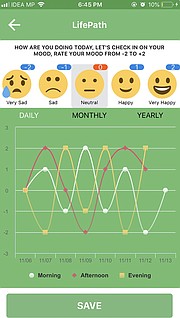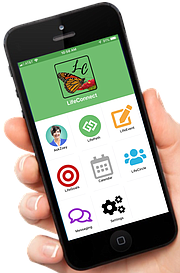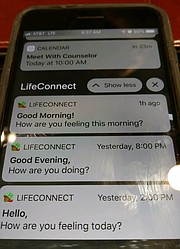Life Recovery Solutions rolling out new tech next month
Something as simple as asking someone how he or she is feeling can make a huge difference in that person's life.
When that person is undergoing treatment or experiencing a life crisis, it means that much more, even if the question comes from a virtual assistant.
"Think about an individual who’s grown up in a dysfunctional household, most likely with a lot of trauma, perhaps some violence and addiction-type behaviors going on," Life Recovery Solutions co-founder Gail Stevenson said Thursday morning. "How often do you think that individual has heard, ‘How was your day today?’ or ‘I’m glad to hear you’re feeling good.’ It just doesn’t happen."
Gail and husband Ed created Life Recovery Solutions in 2014 to provide support tools for health care providers. Based in Coeur d’Alene, Life Recovery Solutions has a mission of "transforming lives and families with respect and compassion to obtain long-term success by staying connected."
The newest tool in the evolution of that care is LifeConnect, a phone application that will be introduced in January.
LifeConnect is a "virtual tether" that gives clients the ability to stay connected with care providers long after inpatient treatment is done. It uses a virtual assistant, Zoey, to interact with clients using a soothing voice and dialogue and questions programmed by Gail and Ed. Gail emphasized that while they provide the tools, she and Ed do not give medical advice.
"All we do is maintain that virtual tether between the professional and the individual," Gail explained. "Zoey becomes their confidant and an encouraging kind voice."
Four years in the making, LifeConnect fills gaps in patient care and homeless assistance. Case workers will no longer have to drive around to find clients to let them know an apartment is available because they'll be able to instantly communicate through the app. Counselors will be able to monitor clients' emotions through a mood tracker, and they'll have better insight into what patients are feeling as they read the clients' journal entries that only the client and care provider have access to.
"The professional can look at what they journaled," Gail said. "When they go in for their session, the professional, instead of them taking a half-hour to drill down to what they were struggling with this week, the professional has it all in writing and they can make their sessions much more productive and efficient. That enables them to drill down to what’s seroiusly going on."
This 24/7 access also allows clients to have an outlet, even when a human isn't available.
"A big issue with people with mental illness or addiction and having their brain all over the place is they're wide awake at 2 in the morning because their brain is racing,” Gail said. "They can journal to Zoey and we learned, when we did our test three years ago, that they will say things to Zoey that they won’t even say in a confidential group or face-to-face with an individual."
Part of this app is LifeCircle, a contact list for users to keep in close contact with those who have their best interests in mind — parents, spouses, siblings, counselors. Individual or group chats can be conducted within this group, which keeps those in rehab from scrolling through their phone's general contacts and possibly relapsing when they come across a dealer or someone who triggers unhealthy behaviors. If the client is spiraling or in need of immediate help, he or she can send out an alert that will be received by members of the LifeCircle list.
"This enables counselors, rehab providers, probation officers, to be more efficient, so even with their overloaded caseloads, they can still serve those people more efficiently so they can reach those people," she said. "It makes their job easier."
The accounts are private and can only be accessed with a login and a password, so if a client loses a phone the information in LifeConnect will remain private.
"There is no other information stored on their phone that could lead anybody to believe they're in recovery or treatment," Ed said, adding that the software is HIPAA (Health Insurance Portability and Accountability Act)-compliant.
"Anybody who is struggling in life can use our software," he said.
The subscription service will vary from about $5 to $15 per person per month, depending on the subscription purchased. Ed said four large local providers have agreed to implement LifeConnect, which is customizable and accessed through Wi-Fi.
"We intentionally keep it reasonable because we really want to help people and we want to see lives and families change for the better,” Gail said.
"We become the tool that all of these agencies can use in common to communicate with a population that is at risk, and they don’t have to fight over it,” Ed said. "Our goal is to turn those people who are struggling into productive members of society. If we can get one person off the street working, our job is done."
Info: www.liferecoverysolution.net







